外研版(2019) 必修第三册 Unit 3 The world of Science Using Languages课件(41张)
文档属性
| 名称 | 外研版(2019) 必修第三册 Unit 3 The world of Science Using Languages课件(41张) | 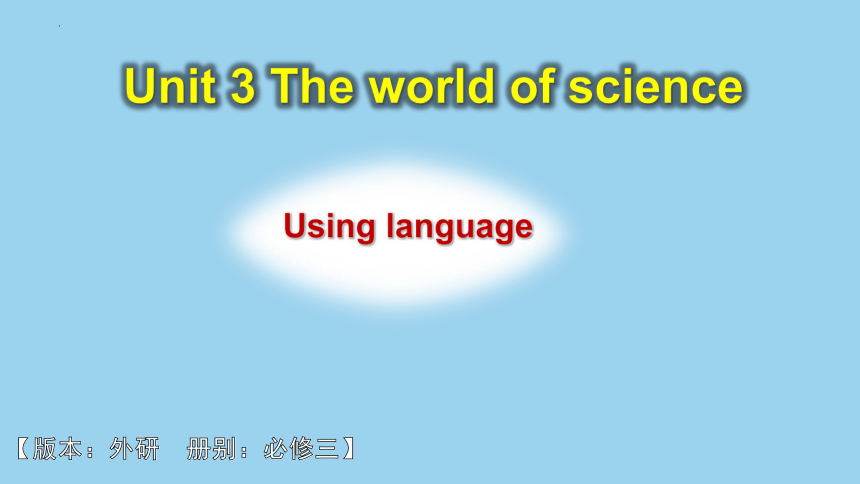 | |
| 格式 | pptx | ||
| 文件大小 | 8.3MB | ||
| 资源类型 | 教案 | ||
| 版本资源 | 外研版(2019) | ||
| 科目 | 英语 | ||
| 更新时间 | 2022-05-23 08:13:41 | ||
图片预览

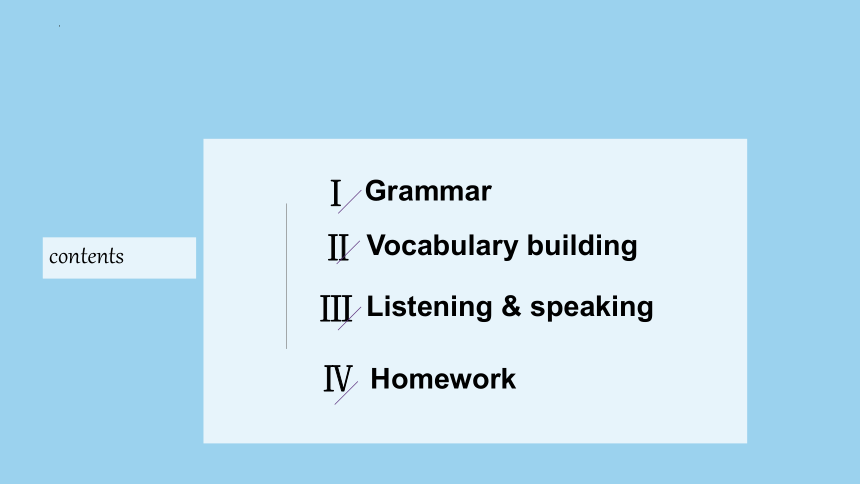
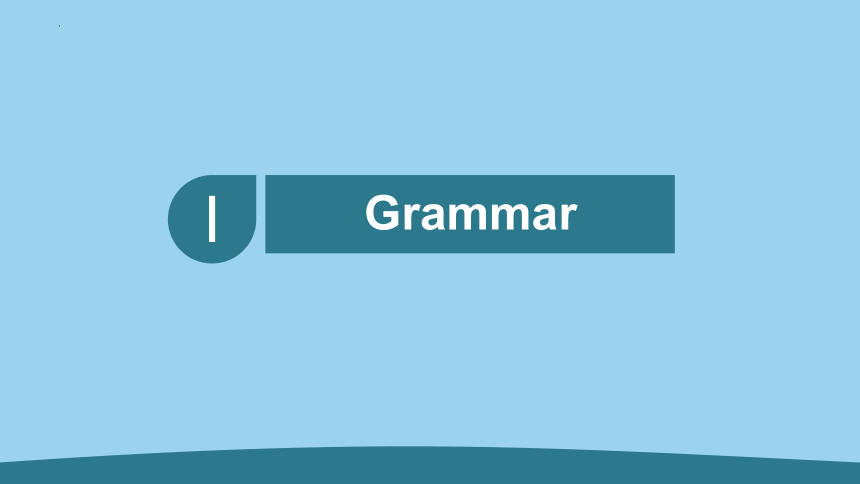
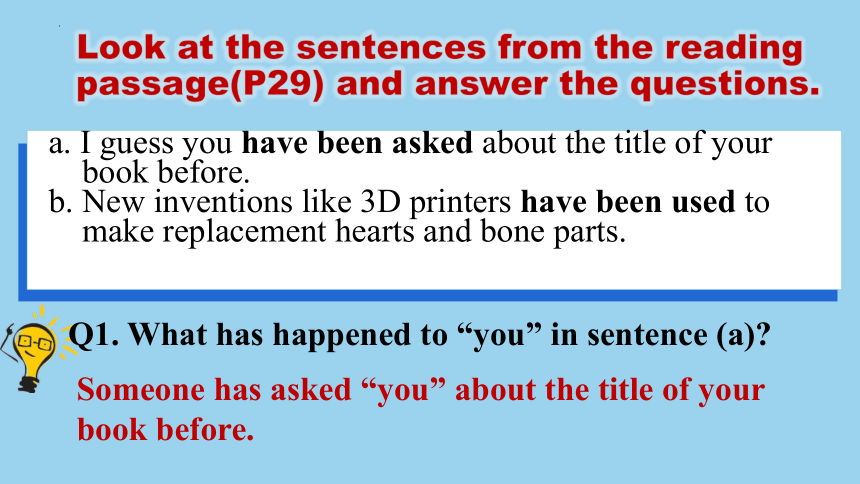
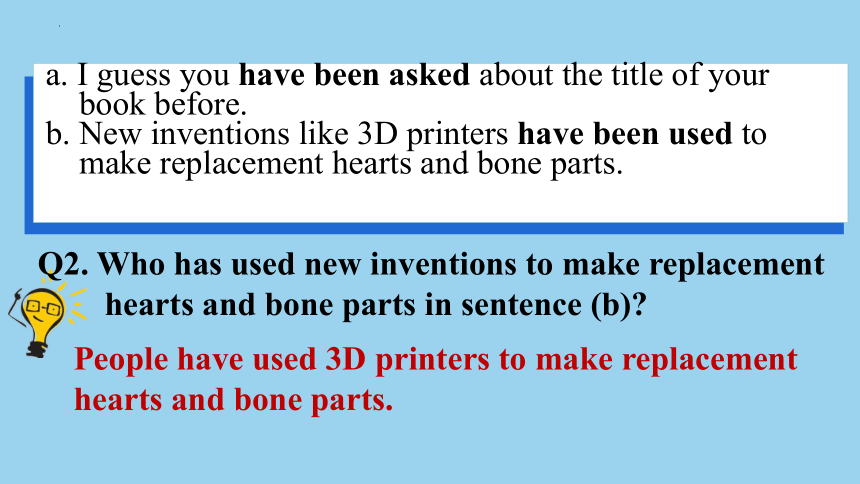
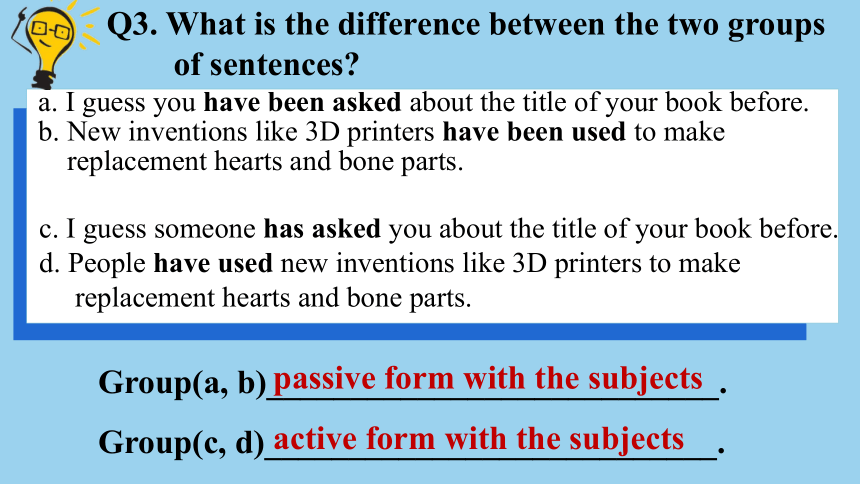
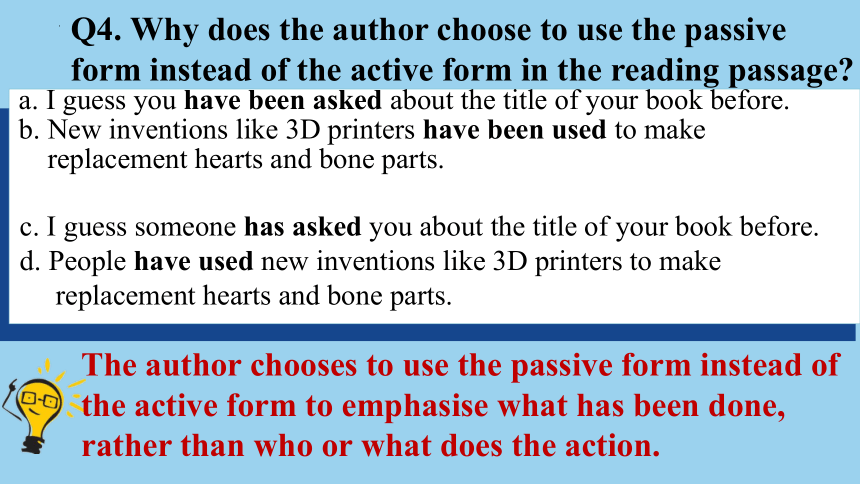
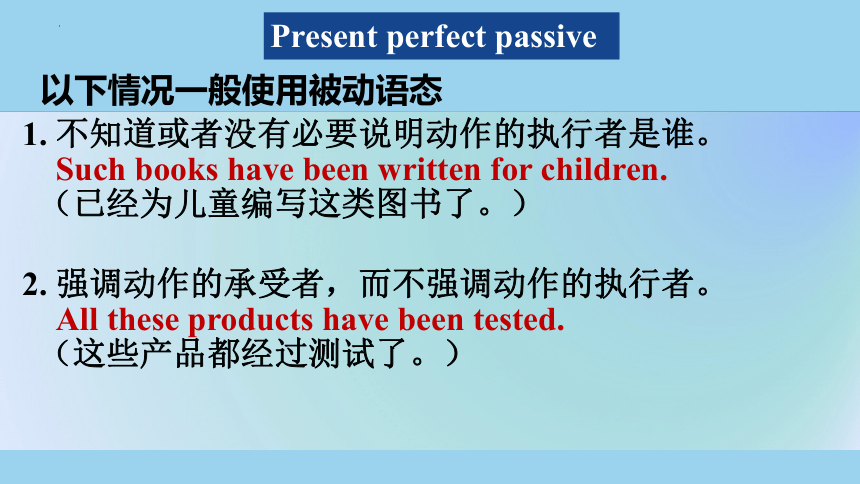
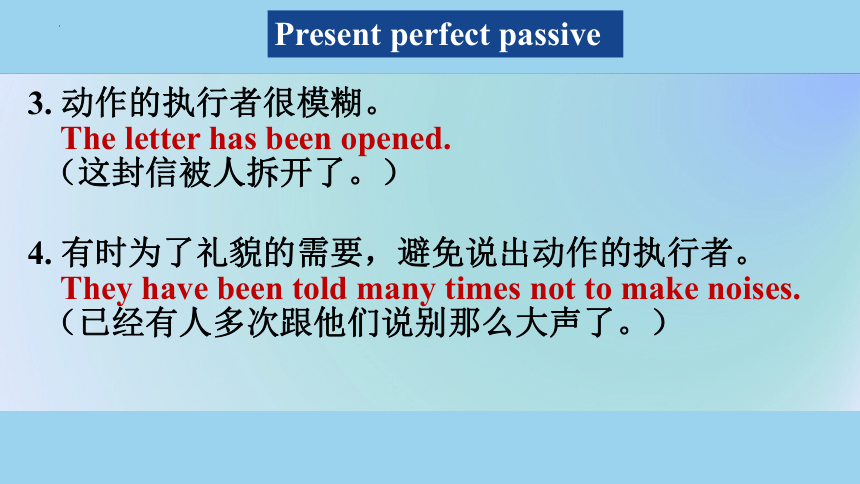
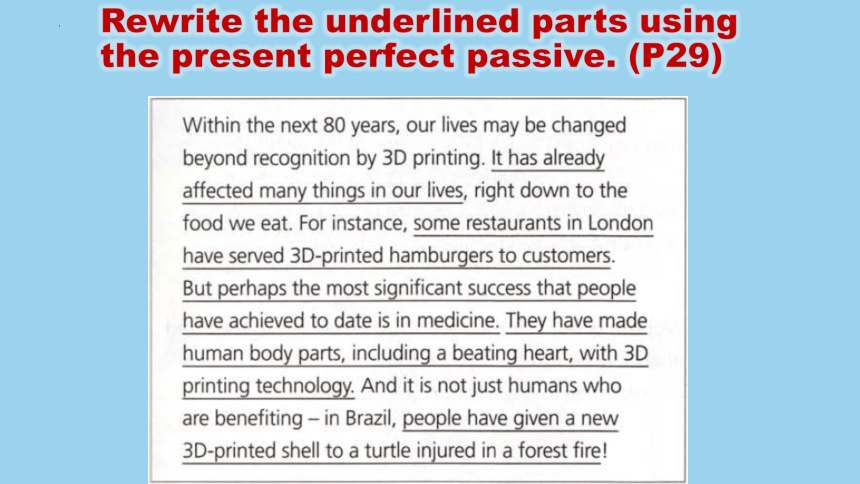
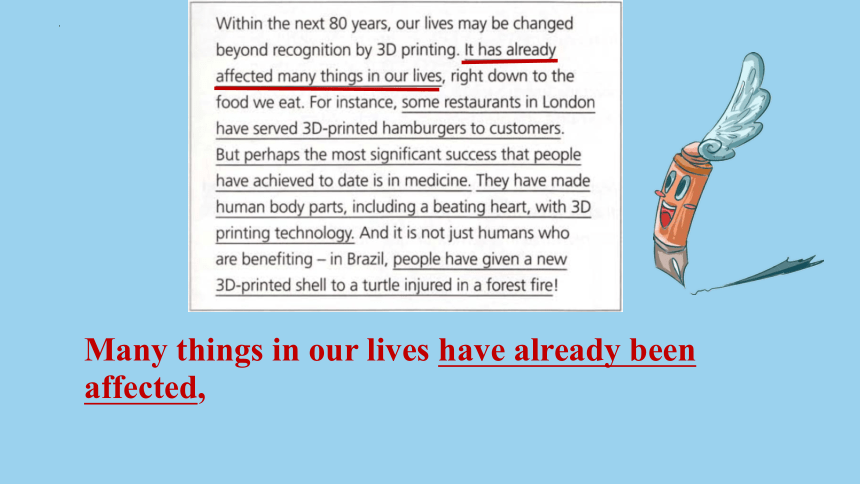
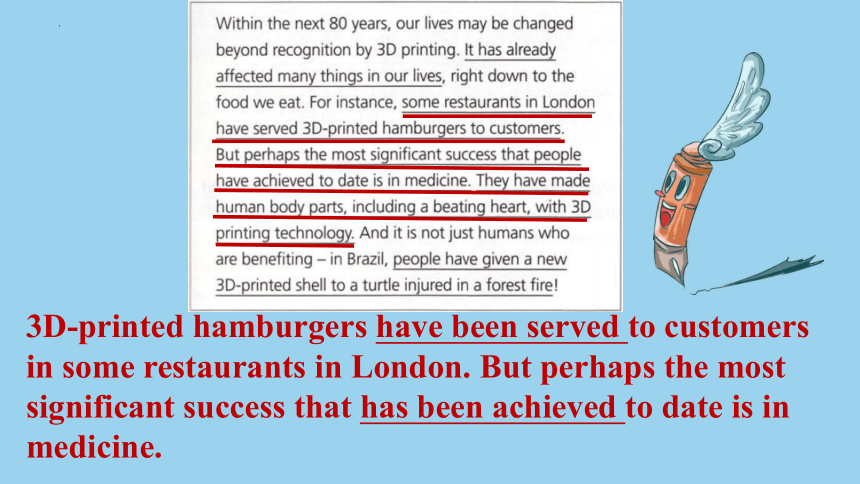
文档简介
(共41张PPT)
Using language
Unit 3 The world of science
【版本:外研 册别:必修三】
contents
Grammar
Vocabulary building
Listening & speaking
Homework
Ⅰ
Ⅱ
Ⅲ
Ⅳ
I
Grammar
0,000 people reading my blog! b I love to photograph the rising sun, …
Look at the sentences from the reading passage(P29) and answer the questions.
a. I guess you have been asked about the title of your
book before.
b. New inventions like 3D printers have been used to
make replacement hearts and bone parts.
Q1. What has happened to “you” in sentence (a)
Someone has asked “you” about the title of your book before.
0,000 people reading my blog! b I love to photograph the rising sun, …
a. I guess you have been asked about the title of your
book before.
b. New inventions like 3D printers have been used to
make replacement hearts and bone parts.
Q2. Who has used new inventions to make replacement
hearts and bone parts in sentence (b)
People have used 3D printers to make replacement hearts and bone parts.
0,000 people reading my blog! b I love to photograph the rising sun, …
Q3. What is the difference between the two groups
of sentences
Group(a, b)___________________________.
Group(c, d)___________________________.
passive form with the subjects
active form with the subjects
a. I guess you have been asked about the title of your book before.
b. New inventions like 3D printers have been used to make
replacement hearts and bone parts.
c. I guess someone has asked you about the title of your book before.
d. People have used new inventions like 3D printers to make
replacement hearts and bone parts.
0,000 people reading my blog! b I love to photograph the rising sun, …
Q4. Why does the author choose to use the passive form instead of the active form in the reading passage
a. I guess you have been asked about the title of your book before.
b. New inventions like 3D printers have been used to make
replacement hearts and bone parts.
c. I guess someone has asked you about the title of your book before.
d. People have used new inventions like 3D printers to make
replacement hearts and bone parts.
The author chooses to use the passive form instead of the active form to emphasise what has been done, rather than who or what does the action.
以下情况一般使用被动语态
Present perfect passive
1. 不知道或者没有必要说明动作的执行者是谁。
Such books have been written for children.
(已经为儿童编写这类图书了。)
2. 强调动作的承受者,而不强调动作的执行者。
All these products have been tested.
(这些产品都经过测试了。)
3. 动作的执行者很模糊。
The letter has been opened.
(这封信被人拆开了。)
4. 有时为了礼貌的需要,避免说出动作的执行者。
They have been told many times not to make noises.
(已经有人多次跟他们说别那么大声了。)
Present perfect passive
Rewrite the underlined parts using the present perfect passive. (P29)
Many things in our lives have already been affected,
3D-printed hamburgers have been served to customers in some restaurants in London. But perhaps the most significant success that has been achieved to date is in medicine.
Human body parts, including a beating heart, have been made with 3D printing technology.
A new 3D-printed shell has been given to a turtle injured in a forest fire!
Imagine you are Dr Moore. Look at the pictures and tell the police about the damage and loss to your lab. Use the present perfect passive where appropriate. (P29)
1. The lock on the door has been broken.
2. The window has been broken.
3. My two laptops have been stolen.
4. Beakers and test tubes have been destroyed.
5. The book case has been opened, and some
files have been taken away while others
have been thrown everywhere.
6. The robot has been damaged.
II
Vocabulary building
Look at the pictures and answer the questions.
1. What do you know about these careers
2. What famous scientists can you name in these fields
A physicist is a person who does research
connected with physics or who studies physics.
A mathematician is a person who is trained in
the study of numbers and calculations.
A chemist is a person who does research connected
with chemistry or who studies chemistry.
An astronomer is a scientist who studies the
stars, planets, and other natural objects in
space.
A geographer is a person who studies geography
or is an expert in it.
A biologist is a person who studies or works in
the field of biology.
Famous scientists in these fields
Albert Einstein
Zu Chongzhi
Kopernik
Noun. -ist Noun. -ian
science
scientist
art
novel
piano
society
artist
novelist
pianist
socialist
library
comedy
physic
history
music
librarian
comedian
musician
physician
historian
Learning to learn
Words about different careers in science can be formed by adding -er, -ist or -ian at the end of the words about subjects, eg biology - biologist.
Complete the introductions about different scientists with the words in Activity 4. Pay attention to the language that describes their careers. (P30)
astronomer
Guo Shoujing (1231-1316) was a famous Chinese 1 __________ of the Yuan Dynasty. He invented twelve new instruments to study
stars and planets. He also developed a calendar which is as accurate as the Gregorian calendar. A mountain on the Moon and a minor planet are named after him.
British 2 ________ Charles Darwin (1809-1882) is best known for his work On the Origin of Species, in which he explains changes in species due to natural selection. His ideas deeply influence our understand- ing of the relationship between humans and nature.
biologist
Li Daoyuan (CA 466-527) was a famous writer and 3___________ of the Northern Wei Dynasty. He did field research across China and studied more than a thousand rivers and streams, along with the landscape, history and culture of the surrounding areas.
geographer
Marie Curie (1867-1934) was a world-famous 4 ________ and was first awarded the Nobel Prize in 1903 for her extraordinary work on
radioactivity. She was also regarded as a brilliant
5 ________, and was again awarded the Nobel Prize in 1911 for the isolation of pure radium.
physicist
chemist
Chen Jingrun (1933-1996) was one of the world’s leading 6 ________________. His work on Chen’s Theorem made an
important advance towards proving Goldbach’s Conjecture, the greatest unsolved problem in number theory.
mathematician
Pair work
Think about other careers in science and discuss what interests you most.
III
Listening & speaking
Did you know
Alzheimer’s disease is a brain disorder that causes problems with memory, thinking and behaviour.
The majority of people with Alzheime’s are
65 and above. It is recognised as the most common mental disease among older people, and the number of sufferers
is growing. Currently, there’s no cure for Alzheimer’s, but scientists are researching ways to improve the quality of life for people living with the disease.
Listen to the conversation and number the pictures in the correct order. (P31)
1
2
3
4
5
Listen again and complete the notes.(P31)
a pair of socks designed for people with
Alzheimer’s diseases
a student from New York
His grandfather
A warning
gets out of bed
Talk about how the speakers describe the story behind an invention. Listen again if necessary.
He used exclamatory sentences to describe the story. Like “How amazing!” “What a useful invention and caring grandson!”
□ Learning to learn
Exclamatory sentences express strong emotions, such as surprise, shock, joy, emphasis and excitement. These are usually formed with what or how, and in written form usually end with an exclamation mark.
Pair work
Act out the conversation about the invention of the telephone.
Student A: Turn to Page 82.
Student B: Turn to Page 85.
Telling the story behind an invention
The telephone was invented by ... in ...
When he ...
He later, and finally ...
The first phone call was about ...
It is interesting that ...
Useful expressions
IV
Homework
1. Summarize the usage of present perfect passive;
2. Choose another story of an invention you know and
have a similar conversation.
Thanks
Using language
Unit 3 The world of science
【版本:外研 册别:必修三】
contents
Grammar
Vocabulary building
Listening & speaking
Homework
Ⅰ
Ⅱ
Ⅲ
Ⅳ
I
Grammar
0,000 people reading my blog! b I love to photograph the rising sun, …
Look at the sentences from the reading passage(P29) and answer the questions.
a. I guess you have been asked about the title of your
book before.
b. New inventions like 3D printers have been used to
make replacement hearts and bone parts.
Q1. What has happened to “you” in sentence (a)
Someone has asked “you” about the title of your book before.
0,000 people reading my blog! b I love to photograph the rising sun, …
a. I guess you have been asked about the title of your
book before.
b. New inventions like 3D printers have been used to
make replacement hearts and bone parts.
Q2. Who has used new inventions to make replacement
hearts and bone parts in sentence (b)
People have used 3D printers to make replacement hearts and bone parts.
0,000 people reading my blog! b I love to photograph the rising sun, …
Q3. What is the difference between the two groups
of sentences
Group(a, b)___________________________.
Group(c, d)___________________________.
passive form with the subjects
active form with the subjects
a. I guess you have been asked about the title of your book before.
b. New inventions like 3D printers have been used to make
replacement hearts and bone parts.
c. I guess someone has asked you about the title of your book before.
d. People have used new inventions like 3D printers to make
replacement hearts and bone parts.
0,000 people reading my blog! b I love to photograph the rising sun, …
Q4. Why does the author choose to use the passive form instead of the active form in the reading passage
a. I guess you have been asked about the title of your book before.
b. New inventions like 3D printers have been used to make
replacement hearts and bone parts.
c. I guess someone has asked you about the title of your book before.
d. People have used new inventions like 3D printers to make
replacement hearts and bone parts.
The author chooses to use the passive form instead of the active form to emphasise what has been done, rather than who or what does the action.
以下情况一般使用被动语态
Present perfect passive
1. 不知道或者没有必要说明动作的执行者是谁。
Such books have been written for children.
(已经为儿童编写这类图书了。)
2. 强调动作的承受者,而不强调动作的执行者。
All these products have been tested.
(这些产品都经过测试了。)
3. 动作的执行者很模糊。
The letter has been opened.
(这封信被人拆开了。)
4. 有时为了礼貌的需要,避免说出动作的执行者。
They have been told many times not to make noises.
(已经有人多次跟他们说别那么大声了。)
Present perfect passive
Rewrite the underlined parts using the present perfect passive. (P29)
Many things in our lives have already been affected,
3D-printed hamburgers have been served to customers in some restaurants in London. But perhaps the most significant success that has been achieved to date is in medicine.
Human body parts, including a beating heart, have been made with 3D printing technology.
A new 3D-printed shell has been given to a turtle injured in a forest fire!
Imagine you are Dr Moore. Look at the pictures and tell the police about the damage and loss to your lab. Use the present perfect passive where appropriate. (P29)
1. The lock on the door has been broken.
2. The window has been broken.
3. My two laptops have been stolen.
4. Beakers and test tubes have been destroyed.
5. The book case has been opened, and some
files have been taken away while others
have been thrown everywhere.
6. The robot has been damaged.
II
Vocabulary building
Look at the pictures and answer the questions.
1. What do you know about these careers
2. What famous scientists can you name in these fields
A physicist is a person who does research
connected with physics or who studies physics.
A mathematician is a person who is trained in
the study of numbers and calculations.
A chemist is a person who does research connected
with chemistry or who studies chemistry.
An astronomer is a scientist who studies the
stars, planets, and other natural objects in
space.
A geographer is a person who studies geography
or is an expert in it.
A biologist is a person who studies or works in
the field of biology.
Famous scientists in these fields
Albert Einstein
Zu Chongzhi
Kopernik
Noun. -ist Noun. -ian
science
scientist
art
novel
piano
society
artist
novelist
pianist
socialist
library
comedy
physic
history
music
librarian
comedian
musician
physician
historian
Learning to learn
Words about different careers in science can be formed by adding -er, -ist or -ian at the end of the words about subjects, eg biology - biologist.
Complete the introductions about different scientists with the words in Activity 4. Pay attention to the language that describes their careers. (P30)
astronomer
Guo Shoujing (1231-1316) was a famous Chinese 1 __________ of the Yuan Dynasty. He invented twelve new instruments to study
stars and planets. He also developed a calendar which is as accurate as the Gregorian calendar. A mountain on the Moon and a minor planet are named after him.
British 2 ________ Charles Darwin (1809-1882) is best known for his work On the Origin of Species, in which he explains changes in species due to natural selection. His ideas deeply influence our understand- ing of the relationship between humans and nature.
biologist
Li Daoyuan (CA 466-527) was a famous writer and 3___________ of the Northern Wei Dynasty. He did field research across China and studied more than a thousand rivers and streams, along with the landscape, history and culture of the surrounding areas.
geographer
Marie Curie (1867-1934) was a world-famous 4 ________ and was first awarded the Nobel Prize in 1903 for her extraordinary work on
radioactivity. She was also regarded as a brilliant
5 ________, and was again awarded the Nobel Prize in 1911 for the isolation of pure radium.
physicist
chemist
Chen Jingrun (1933-1996) was one of the world’s leading 6 ________________. His work on Chen’s Theorem made an
important advance towards proving Goldbach’s Conjecture, the greatest unsolved problem in number theory.
mathematician
Pair work
Think about other careers in science and discuss what interests you most.
III
Listening & speaking
Did you know
Alzheimer’s disease is a brain disorder that causes problems with memory, thinking and behaviour.
The majority of people with Alzheime’s are
65 and above. It is recognised as the most common mental disease among older people, and the number of sufferers
is growing. Currently, there’s no cure for Alzheimer’s, but scientists are researching ways to improve the quality of life for people living with the disease.
Listen to the conversation and number the pictures in the correct order. (P31)
1
2
3
4
5
Listen again and complete the notes.(P31)
a pair of socks designed for people with
Alzheimer’s diseases
a student from New York
His grandfather
A warning
gets out of bed
Talk about how the speakers describe the story behind an invention. Listen again if necessary.
He used exclamatory sentences to describe the story. Like “How amazing!” “What a useful invention and caring grandson!”
□ Learning to learn
Exclamatory sentences express strong emotions, such as surprise, shock, joy, emphasis and excitement. These are usually formed with what or how, and in written form usually end with an exclamation mark.
Pair work
Act out the conversation about the invention of the telephone.
Student A: Turn to Page 82.
Student B: Turn to Page 85.
Telling the story behind an invention
The telephone was invented by ... in ...
When he ...
He later, and finally ...
The first phone call was about ...
It is interesting that ...
Useful expressions
IV
Homework
1. Summarize the usage of present perfect passive;
2. Choose another story of an invention you know and
have a similar conversation.
Thanks
